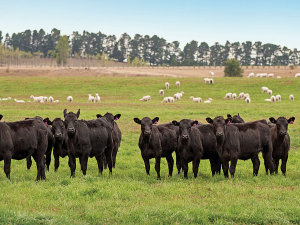Beef Progeny Test strengthens NZ beef genetics
Mating wrapped up last month at the across-breed Beef Progeny Test on Pāmu’s Kepler Farm in Manapouri.
 Keeping cow size moderate while maximising weight of finishing cattle at 18 months of age seems to be a bit of a pipe dream.
Keeping cow size moderate while maximising weight of finishing cattle at 18 months of age seems to be a bit of a pipe dream.
This is the second in a series of articles from Beef + Lamb New Zealand’s Informing New Zealand Beef programme.
The seven-year INZB partnership, supported by Beef + Lamb New Zealand and the Ministry for Primary Industries’ Sustainable Food and Fibre Futures fund, aims to boost the sector’s profits by $460m. Focused on increasing the use of highquality genetics in the beef industry, the four main components of the programme are developing New Zealand-specific breeding indexes, supporting the development of an across breed genetic evaluation and development of data infrastructure, running a beef progeny test and linking in data from commercial herds.
It's a simple job description for finisher cattle – grow big and be quick about it. We want moderate-sized calves born, uneventfully, to moderate-sized cows. And then one day when the weather is neither too wet nor too dry we want these little calves to burst forth like the Incredible Hulk into 600kg+ prime cattle.
But pesky biology wants to get in the way of our dreams…
The B+LNZ geneticists have pored over the growth data from nine years of running the Beef Progeny Test. They have found strong genetic correlations for mature live weight with 18-month weight (0.92) and carcase weight (0.82). So yes, cattle that are destined to be big guys and gals were big 18-month-olds and big on the hooks too. That is all well and good in finishing animals. An extra 30 kg of live weight as an 18-month-old puts them on track to be slaughtered a month earlier. But breeding for those baby Hercules at 18 months of age might also add an extra 46 kg of mature live weight to the next generation of breeding cows. Those bigger calves are likely to have equally bulky mothers and sisters who need more pasture to keep them going.
It means that keeping cow size moderate while maximising weight of finishing cattle at 18 months of age seems to be a bit of a pipe dream – at a correlation of 0.92 there just isn’t much room to move. However, 18-month-weight is not the same as carcase weight! The B+LNZ researchers have found that carcase weight EBVs only explain about 67% of the variation in mature weight. This means that there is a bit of wiggle room (see graph) for producing heavier carcases without increasing cow size.
The main challenge is to find the right balance between good carcase weights with cows that will work in your environment, highlighting the value of matching the right genetics to your herd. Recording more carcase data is important to help us identify those animals that are heavy on the hook from more moderate sized cows.
The 5+ A Day Charitable Trust has launched a collection of affordable recipes designed to turn everyday vegetables into seasonal stars.
Jane Mellsopp has been confirmed as the new Government Appointee to the New Zealand Meat Board (NZMB).
To celebrate the tenth anniversary of its annual Good Deeds competition, Rabobank will give away $100,000 to improve rural community hubs, schools, clubrooms, and marae across New Zealand.
Agricultural and veterinary product supplier Shoof International has appointed Michaela Dumper as its new chief executive.
Federated Farmers is celebrating following the Government's announcement that young farmers will be able to use their KiwiSaver funds to buy their first home or farm.
The Meat Industry Association of New Zealand (MIA) today announced that Chief Executive Officer Sirma Karapeeva has resigned from the role.